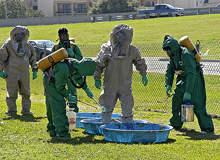
More than a year after the H1N1 influenza pandemic, the effects are still evident. In response to criticism of their handling of the crisis, the US government has launched sweeping reviews concerning the development of countermeasures.
Beyond H1N1 however, emerging infectious diseases, global pandemics and the ever-developing threat of sophisticated bioterrorism have all been earmarked as substantial threats to US national security, carrying the potential for catastrophic impact.
The US Government has come under criticism for its apparent inability to handle the ‘chronic challenges’ in producing effective countermeasures against such threats quickly and efficiently. Speaking at the launch of the reviews, US Health and Human Services Secretary Kathleen Sebelius spoke of the need for a national system to ensure prompt response, commenting that: “Our nation must have a system that is nimble and flexible enough to produce medical countermeasures in the face of an attack or threat, whether it’s as we know today or new measures.”
“By moving towards a 21st century countermeasure enterprise with a strong base of discovery, clear regulatory pathway and agile manufacturing processes, we will be able to respond faster and more affectively to public health threats,” she added.
Pharmaceutical cooperation
Following consultation with a number of pharmaceutical firms, various measures have been put into place in order to encourage innovative solutions and processes from the pharmaceutical industry.
The removal of innovation barriers, such as lengthy clinical trial processes and legislation, as well as the reduction of opportunity costs for the private sector is hoped to be achieved by the provision of a full suite of testing, evaluation, product developments and manufacturing processes.
How well do you really know your competitors?
Access the most comprehensive Company Profiles on the market, powered by GlobalData. Save hours of research. Gain competitive edge.

Thank you!
Your download email will arrive shortly
Not ready to buy yet? Download a free sample
We are confident about the unique quality of our Company Profiles. However, we want you to make the most beneficial decision for your business, so we offer a free sample that you can download by submitting the below form
By GlobalDataThe US government also hopes to promote regulatory innovation and investment by providing pharmaceutical companies within the private sector with increased access to regulatory procedures and clarifying a clear and precise pathway to approval.
Manufacturing processes capable of producing multiple medications and/or vaccines simultaneously would demonstrate their worth in such a scenario and have been encouraged within the review.
Financial incentives and rewards to companies who succeed in developing the necessary countermeasures, including any potential medical devices that could aid in this development, will also be provided to further encourage this development, with the total investment to streamline the regulatory process thought to be in the region of $2bn.
Bavarian Nordic CEO and President Anders Hedegaard has declared his support for the changes, indicating his belief that the efforts made to overhaul regulatory processes, augment manufacturing capacity and improve development of novel technologies is “a sign that the Obama administration takes seriously this national security priority.”
Whilst response to these measures has been largely positive, there is still likely to be caution considering allegations of corruption in the midst of the 2009 influenza pandemic.
A number of members on an advisory panel for the World Health Organisation, advised WHO on the classification of the pandemic itself and the most beneficial procedures to quell its spread, were later found to have connections with a number of multinational pharmaceutical companies who stood to make substantial profits from vaccines and antiviral medications, such as Tamiflu.
Another potential pitfall lies in the lack of investors keen to approach a market where profits are substantially lower than competing pharmaceutical markets, such is the global attitude to stockpile mass amounts for use in an emergency. In response, help will be provided to companies seeking investors, with further financial incentives also possible.
Bold steps, not incremental improvements
Kathleen Sebelius signalled US intentions by calling for “bold steps, rather than incremental improvements” and highlighted the need for urgent action.
Although pharmaceutical firms within the private sector bore the brunt of the reviews, the US Food and Drug Administration were also singled out in the call for change.
Sebelius called upon the FDA to upgrade its science and regulatory capacity to compensate for increased demand, and several initiatives launched with the aim of shaving weeks off the time to test and manufacture potential vaccines.
The FDA will be provided with the resources necessary to create a clear and concise regulatory pathway for biological companies to follow, analyse discoveries faster and solve scientific problems as and when they occur. Product developers will also be contacted earlier, so they know what to expect before potential countermeasures are delivered.
New Centers of Innovation and Advanced Development and Manufacturing will also be established in order to provide new, flexible manufacturing platforms for use not only in the manufacturing process, but to provide small biological companies with knowledge of regulatory and manufacturing techniques in order to promote innovation.
NIH resources will also be re-evaluated and distributed in order to identify and nurture promising discoveries earlier on, including the creation of new ‘Sherpa’ teams to guide them through the process.
Modernising ways in which to test a vaccine’s potency, new ways to check its safety and efficacy as well as producing a ‘seed virus’ quicker would all lead to significant time savings.
Cooperation is vital
The view that cooperation is needed in order to successfully combat rare diseases, pandemic and bioterrorism threats is not one held solely by the US.
European Clinical Research Infrastructure Network (ECRIN) Project Coordinator Dr. Jacques Demotes-Mainard, believes that cooperation between nations will lead to an infrastructure capable of a rapid process of developing countermeasures.
“The harmonisation of legislation, particularly in the use of clinical trials to produce an infrastructure to support such a venture, would be vital and there will be a lot of money invested in both sides of the Atlantic in order to develop the required infrastructure.
“The process of clinical trials that is usually limited to the US, Europe or Japan could spread to South Africa, Australia or New Zealand and this can only be considered a good thing for the treatment of these rare diseases,” added Demotes-Mainard.







